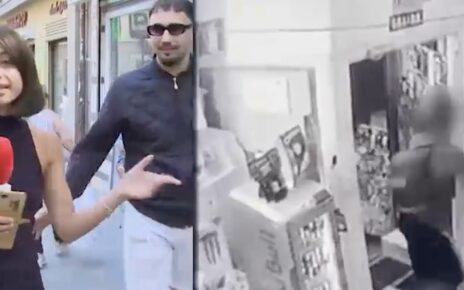By Chris Barrett and Nuttakarn Sumon
Anucha, Wanida Ma-asa and their daughter Rinlada, who is now 7.
Save articles for later
Add articles to your saved list and come back to them any time.
When she was first alerted to the photograph of her husband being held at gunpoint near the Gaza Strip, Wanida Ma-asa thought it was a prank.
It was late in the afternoon on October 7, the day Hamas militants set out on their murderous rampage in southern Israel. The 30-year-old mother of one had been taking a nap at her home in the district of Kudjab in Thailand’s north-eastern Udon Thani province.
Anucha Angkaew, a 28-year-old Thai farmworker, was captured by Hamas militants in southern Israel on October 7.
“I woke up and saw the picture in our family [social media] group,” she said. “My aunt had seen it on a Facebook group for workers in Israel.
“I thought it wasn’t real because the picture looked so scary. The first thing I did was call the mother of my husband and said ‘what is this?’. She was crying and said : ‘He’s been taken’.”
In the image, her husband Anucha Angkaew, whose nickname is Art, could be seen with his hands tied behind his back and his head bowed sitting against a wall beside four other men, an assault rifle in the foreground pointed at them.
The 28-year-old avocado farmer was captured as Hamas killing squads burst through the border fence from Gaza that morning and slaughtered more than 1400 soldiers and civilians, including children.
He was caught up in the onslaught along with many other Thais, who have constituted the vast majority of the foreign labour force in Israel’s agricultural sector.
The government of Thai Prime Minister Srettha Thavisin has said 32 of its citizens were slain, a greater toll than any nationality besides Israelis and Palestinians. Palestinians have suffered more than 9000 reported deaths in the Israeli air strikes that have battered Gaza in the weeks since.
A photo of Anucha, far left, captured by Hamas, that circulated on Facebook.
Of the more than 200 people taken hostage and yet to be released, 22 are Thais, among them Anucha.
He had been living and working for the past 1½ years in Israel’s rural south at Kibbutz Re’im, about four kilometres from Gaza and close to the site of a music festival where Israeli authorities said at least 260 people were massacred on October 7.
He is well known among the Thai migrant workers’ community there for his enthusiasm for soccer and takraw, a form of volleyball in which players use their feet rather than their hands. That Saturday, his only day off for the week, he was going to be playing sport.
Wanida last spoke to him, on a video call, the night before he was abducted.
“He must have been taken around 8am Israel time because the last message [he sent] was to his friend, who also worked there, just before then,” she said.
“He told the guy to go hide. That’s why he this guy wasn’t taken, because he got the message from Art.”
Some Thai migrant farmworkers returned to Bangkok on October 12. Credit: Getty
As Israel seeks retribution for the worst attack in its 75-year history and works to wipe out Hamas, officials in Bangkok have been busy attempting to extricate its people from the conflict zone.
Thavisin has urged more than 30,000 mostly Thai farm labourers in Israel to return home. Nearly 9000 of them have done so on government-arranged repatriation flights.
At the same time, his government has called on Hamas to release the Thai hostages while a delegation from the Muslim-majority deep south region of Thailand, where a low-level separatist insurgency has been waged for decades, is also lobbying for a favourable outcome.
This week they flew back from Iran, which sponsors Hamas, where they met representatives from the Islamist group as well as leadership figures in Tehran.
“We came there to beg for mercy for the Thai workers because they have nothing to do with the war,” said Areepen Uttarasin, an adviser to Thailand’s House Speaker who led the visiting party.
“They told us to inform their relatives that they were treated well and faced no hardship. But to fix the release date may not be possible because they may be harmed by the opponent’s bombardment.”
Hamas also said this week it would release some foreigners held captive in Gaza, having a fortnight ago let go American Judith Raanan and her daughter Natalie and two elderly Israeli women.
Anucha, Wanida Ma-asa and their daughter Rinlada, who is now 7.
Each day they are held, however, has brought more heartache for families like Anucha’s.
Like the tens of thousands of Thais working on farms and orchards, he had taken up a contract there as part of an agreement between Israel and Bangkok reached in 2011.
The deal, which permits Thais to work in the country for five years in agriculture, has provided a much-needed boost to Israel’s manpower on the land. Thais workers can also earn far more than they would at home and send a large slice to their families.
While it seems like a win-win, labour and human rights groups have highlighted significant drawbacks with the system, not least instances of mistreatment of employees, including underpayment.
Between the price of a plane ticket, health insurance and other fees, the cost of going to work in Israel can stretch beyond 100,000 baht ($4300), which leaves many saddled with debt.
“Thai migrant workers are at high risk of forced labour and human trafficking [modern slavery] both from regular and irregular migration, often at very high or extortionate cost, to countries like Israel, Taiwan, Nordic berry -picking regions [such as Sweden, Finland], Hong Kong and across the world,” said Andy Hall, an international migrant worker rights specialist who lived in Thailand for 14 years and speaks fluent Thai.
Thai farmworkers on a chicken farm in Margaliyot, Israel. Thais comprise a great proportion of Israel farmworkers due to a labour deal between the two countries.Credit: Kate Geraghty
Amid the threat of the war expanding to several fronts in the region, Thavisin’s government is offering incentives for Thais to leave.
It has said they will receive 15,000 baht ($650) upon their return, and there are plans to offer them low-interest loans of up to 150,000 baht ($6500), the Thai Finance Ministry said this week.
Israel would be left in the lurch by a greater exodus of Thai workers than has already taken place, but two-thirds have so far stayed there, prepared to brave the danger because of the comparative financial reward.
“We hear the outcry of Thai workers who stayed in Israel and are in fear for their lives,” said Shahar Shohm, a researcher with Tel-Hai Academic College in Israel who helped form an aid group for Thai agricultural workers at the outset of the war.
“Many work and live in spaces lacking standard protective measures, such as shelters and fortified rooms. Moreover, the Iron Dome system does not protect open fields, leaving many unprotected.”
Shohm said Thai workers employed near Gaza had raised their safety concerns for years, including about having to live under the threat of shelling.
According to her, they have largely been ignored.
“For the Thai migrants living among us, economically supporting their families back home is a matter of survival,” she said. “Now, they are left with a fatal dilemma: whether to stay in Israel and risk their lives in a war that is not for them to fight.”
Back in north-eastern Thailand, Wanida has been wrestling with a different reality since Anucha’s kidnapping.
She has been relying on Thais in Israel for any word on the hostages, and on phone calls to her local MP.
She has also leaned heavily on her Buddhist faith, desperate for Anucha to be returned to her and their seven-year-old daughter Rinlada.
“The first week I could not eat, I could not sleep, I could not do anything.
“After the first week, being a Thai I went to any fortune-teller I could, and I did anything that I could do to help,” she said.
“Our beliefs say that if you let go of life, you get life in return, so I went and released fish here and there, all the time, everywhere.
“Everybody there [in Israel] said he is safe, and the Thai workers say [Hamas] will release him. But I still cannot help worrying about him.”
More coverage of the Hamas-Israel conflict
- Cascading violence: Tremors from the Hamas attacks and Israel’s response have reached far beyond the border. But what would all-out war in the Middle East look like?
- The human cost: Hamas’ massacre in Israel has traumatised – and hardened – survivors. And in Gaza, neighbourhoods have become ghost cities.
- “Hamas metro”: Inside the labyrinthine network of underground tunnels, which the Palestinian militant group has commanded beneath war-ravaged Gaza for 16 years. The covert corridors have long provided essential channels for the movement of weapons and armed combatants.
- What is Hezbollah?: As fears of the conflict expanding beyond Israel and Hamas steadily rise, all eyes are on the militant group and political party that controls southern Lebanon and has been designated internationally as a terrorist group. How did it form and what does Iran have to do with it?
Get a note directly from our foreign correspondents on what’s making headlines around the world. Sign up for the weekly What in the World newsletter here.
Most Viewed in World
Source: Read Full Article








